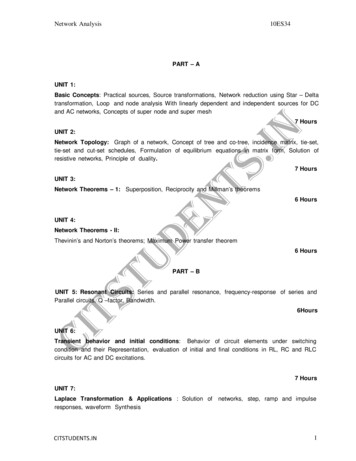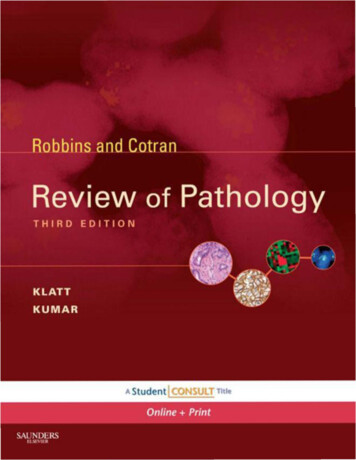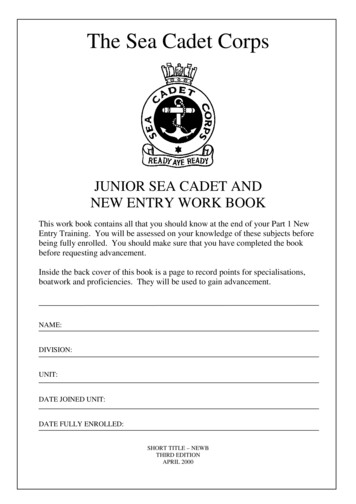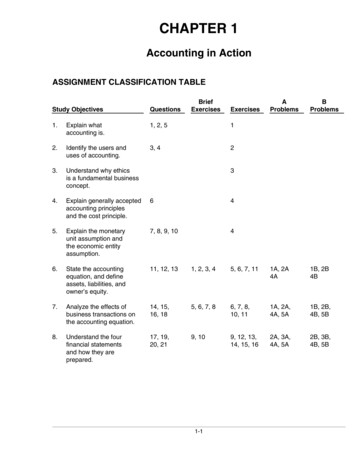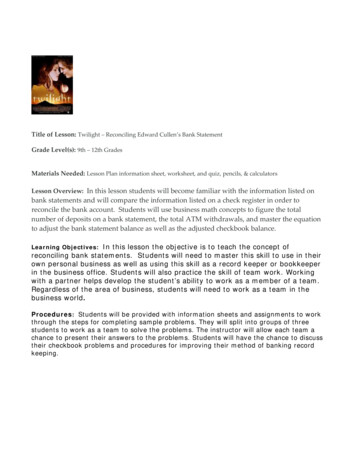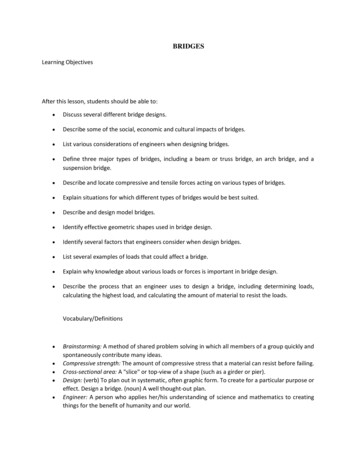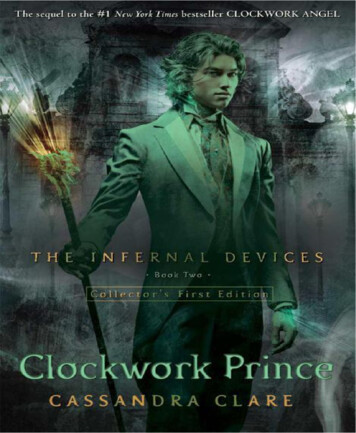
Transcription
EXCLUSIVE TO THIS EDITION OF CLOCKWORK PRINCE:A never-before-seen letter from Will to his family.THE INFERNAL DEVICESPrequel to the internationally bestselling Mortal Instrumentsseries#1 NEW YORK TIMES BESTSELLERUSA Today Bestseller * Wall Street Journal Bestseller *Publishers Weekly BestsellerTHE MORAL INSTRUMENTS#1 NEW YORK TIMES BESTSELLING SERIESUSA Today Bestseller * Wall Street Journal Bestseller *
Publishers Weekly BestsellerOVER 4 MILLION COPIES IN PRINTTranslated into more than 30 languagesSoon to be a major motion picture from Sony Studios
Inthe magical underworld of Victorian London, Tessa Gray has at lastfound safety with the Shadowhunters. But that safety proves fleeting whenrogue forces in the Clave plot to see her protector, Charlotte, replaced ashead of the Institute. If Charlotte loses her position, Tessa will be out onthe street—and easy prey for the mysterious Magister, who wants to useTessa’s powers for his own dark ends.With the help of handsome, self-destructive Will and the fiercelydevoted Jem, Tessa discovers that the Magister’s war on theShadowhunters is deeply personal. He blames them for a long-agotragedy that shattered his life. To unravel the secrets of the past, the triojourneys from mist-shrouded Yorkshire to a manor house that holdsuntold horrors, from the slums of London to an enchanted ballroomwhere Tessa discovers that the truth of her parentage is more sinister thanshe had imagined. When they encounter a clockwork demon bearing awarning for Will, they realize that the Magister knows their every move—and that one of their own has betrayed them.Tessa finds her heart drawn more and more to Jem, though her longingfor Will, despite his dark moods, continues to unsettle her. But somethingis changing in Will—the wall he has built around himself is crumbling.Could finding the Magister free Will from his secrets and give Tessa theanswers about who she is and what she was born to do?As their dangerous search for the Magister and the truth leads thefriends into peril, Tessa learns that when love and lies are mixed, they cancorrupt even the purest heart.CASSANDRA CLAREis the New York Times bestselling author of the Mortal Instruments series.She was born overseas and spent her early years traveling around theworld with her family and several trunks of books. Cassandra lives inwestern Massachusetts with her husband, their cats, and these days, evenmore books. Visit her online at cassandraclare.com.TheInfernalDevices.com
JACKET DESIGN BY RUSSELL GORDONJACKET PHOTO-ILLUSTRATIONCOPYRIGHT 2011 BY CLIFF NIELSENMargaret K. McElderry BooksSIMON & SCHUSTER * NEW YORKEXTRAS ON YOUR SMARTPHONEDownload the free Microsoft Tag app at http://gettag.mobi. While in
the app, hold your phone’s camera a few inches away from the tag imageon the back cover and it will automatically take you to extra contentrelating to this book.Watch videos, get extras, and read exclusives atTEEN.SimonandSchuster.com
THE INFERNAL DEVICES Book Two Clockwork Prince
Also by Cassandra ClareTHE MORTAL INSTRUMENTS:City of BonesCity of AshesCity of GlassCity of Fallen AngelsTHE INFERNAL DEVICES:Clockwork Angel
MARGARET K. McELDERRY BOOKSAn imprint of Simon & Schuster Children’s Publishing Division1230 Avenue of the Americas, New York, New York 10020www.SimonandSchuster.comThis book is a work of fiction. Any references to historical events, realpeople, or real locales are used fictitiously. Other names, characters, places,and incidents are products of the author’s imagination, and any resemblanceto actual events or locales or persons, living or dead, is entirely coincidental.Copyright 2011 by Cassandra Claire LLCAll rights reserved, including the right of reproduction in whole or in part inany form. MARGARET K. MCELDERRY BOOKS is a trademark of Simon &Schuster, Inc.The Simon & Schuster Speakers Bureau can bring authors to your liveevent. For more information or to book an event, contact the Simon &Schuster Speakers Bureau at 1-866-248-3049 or visit our website atwww.simonspeakers.com.Book design by Mike RosamiliaThe text for this book is set in Dolly.Manufactured in the United States of America2 4 6 8 10 9 7 5 3 1Library of Congress Cataloging-in-Publication Data Clare, Cassandra.Clockwork prince / Cassandra Clare.—1st ed.p. cm.—(The infernal devices ; bk. 2)Summary: As the Council attempts to strip Charlotte of her power,sixteen-year-old orphaned shapechanger Tessa Gray works with the LondonShadowhunters to find the Magister and destroy his clockwork army, learningthe secret of her own identity while investigating his past.ISBN 978-1-4169-7588-5 (hardcover)ISBN 978-1-4424-3134-8 (eBook)[1. Supernatural—Fiction. 2. Demonology—Fiction. 3. Orphans—Fiction.4. Secret societies—Fiction. 5. Identity—Fiction. 6. London (England)—History—19th century—Fiction. 7. Great Britain—History—Victoria, 1837–1901—Fiction.] I. Title.PZ7.C5265Cp 2011
[Fic]—dc232011017869
For ElkaKhalepa ta kala
“I wish you to know that you have been the last dream of my soul. . . .Since I knew you, I have been troubled by a remorse that I thought wouldnever reproach me again, and have heard whispers from old voicesimpelling me upward, that I thought were silent for ever. I have hadunformed ideas of striving afresh, beginning anew, shaking off sloth andsensuality, and fighting out the abandoned fight. A dream, all a dream,that ends in nothing. . . .”— Charles Dickens, A Tale of Two Cities
ContentsPrologueChapter 1: The Council ChamberChapter 2: ReparationsChapter 3: Unjustifiable DeathChapter 4: A JourneyChapter 5: Shades of the PastChapter 6: In Silence SealedChapter 7: The CurseChapter 8: A Shadow On the SoulChapter 9: Fierce MidnightChapter 10: The Virtue of AngelsChapter 11: Wild UnrestChapter 12: MasqueradeChapter 13: The Mortal SwordChapter 14: The Silent City
Chapter 15: Thousands MoreChapter 16: Mortal RageChapter 17: In DreamsChapter 18: Until I DieChapter 19: If Treason Doth ProsperChapter 20: The Bitter RootChapter 21: Coals of FireAcknowledgmentsA Note On Tessa’s England
THE INFERNAL DEVICES Book Two Clockwork Prince
PROLOGUEThe Outcast DeadThe fog was thick, muffling sound and sight. Where it parted, Will Herondalecould see the street rising ahead of him, slick and wet and black with rain,and he could hear the voices of the dead.Not all Shadowhunters could hear ghosts, unless the ghosts chose to beheard, but Will was one of those who could. As he approached the oldcemetery, their voices rose in a ragged chorus—wails and pleading, criesand snarls. This was not a peaceful burial ground, but Will knew that; it wasnot his first visit to the Cross Bones Graveyard near London Bridge. He didhis best to block out the noises, hunching his shoulders so that his collarcovered his ears, head down, a fine mist of rain dampening his black hair.The entrance to the cemetery was halfway down the block: a pair ofwrought iron gates set into a high stone wall, though any mundane passingby would have observed nothing but a plot of overgrown land, part of anunnamed builder’s yard. As Will neared the gates, something else nomundane would have seen materialized out of the fog: a great bronzeknocker in the shape of a hand, the fingers bony and skeletal. With agrimace Will reached out one of his own gloved hands and lifted the knocker,letting it fall once, twice, three times, the hollow clank resounding through thenight.Beyond the gates mist rose like steam from the ground, obscuring thegleam of bone against the rough ground. Slowly the mist began to coalesce,taking on an eerie blue glow. Will put his hands to the bars of the gate; thecold of the metal seeped through his gloves, into his bones, and he shivered.It was a more than ordinary cold. When ghosts rose, they drew energy fromtheir surroundings, depriving the air around them of heat. The hairs on theback of Will’s neck prickled and stood up as the blue mist formed slowly intothe shape of an old woman in a ragged dress and white apron, her headbent.
“Hallo, Mol,” said Will. “You’re looking particularly fine this evening, if I dosay so.”The ghost raised her head. Old Molly was a strong spirit, one of thestronger Will had ever encountered. Even as moonlight speared through agap in the clouds, she hardly looked transparent. Her body was solid, herhair twisted in a thick yellow-gray coil over one shoulder, her rough, redhands braced on her hips. Only her eyes were hollow, twin blue flamesflickering in their depths.“William ’erondale,” she said. “Back again so soon?”She moved toward the gate with that gliding motion peculiar to ghosts. Herfeet were bare and filthy, despite the fact that they never touched the ground.Will leaned against the gate. “You know I missed your pretty face.”She grinned, her eyes flickering, and he caught a glimpse of the skullbeneath the half-transparent skin. Overhead the clouds had closed in on oneanother again, blocking out the moon. Idly, Will wondered what Old Molly haddone to get herself buried here, far from consecrated ground. Most of thewailing voices of the dead belonged to prostitutes, suicides, and stillbirths—those outcast dead who could not be buried in a churchyard. Although Mollyhad managed to make the situation quite profitable for herself, so perhapsshe didn’t mind.She chortled. “What d’you want, then, young Shadow-hunter? Malphasvenom? I ’ave the talon of a Morax demon, polished very fine, the poison atthe tip entirely invisible—”“No,” Will said. “That’s not what I need. I need Foraii demon powders,ground fine.”Molly turned her head to the side and spat a tendril of blue fire. “Nowwhat’s a fine young man like you want with stuff like that?”Will just sighed inwardly; Molly’s protests were part of the bargainingprocess. Magnus had already sent Will to Old Mol several times now, oncefor black stinking candles that stuck to his skin like tar, once for the bones ofan unborn child, and once for a bag of faeries’ eyes, which had drippedblood on his shirt. Foraii demon powder sounded pleasant by comparison.“You think I’m a fool,” Molly went on. “This is a trap, innit? You Nephilimcatch me selling that sort of stuff, an’ it’s the stick for Old Mol, it is.”
“You’re already dead.” Will did his best not to sound irritable. “I don’t knowwhat you think the Clave could do to you now.”“Pah.” Her hollow eyes flamed. “The prisons of the Silent Brothers,beneath the earth, can ’old either the living or the dead; you know that,Shadowhunter.”Will held up his hands. “No tricks, old one. Surely you must have heard therumors running about in Downworld. The Clave has other things on its mindthan tracking down ghosts who traffic in demon powders and faerie blood.”He leaned forward. “I’ll give you a good price.” He drew a cambric bag fromhis pocket and dangled it in the air. It clinked like coins rattling together.“They all fit your description, Mol.”An eager look came over her dead face, and she solidified enough to takethe bag from him. She plunged one hand into it and brought her palm out fullof rings—gold wedding rings, each tied in a lovers’ knot at the top. Old Mol,like many ghosts, was always looking for that talisman, that lost piece of herpast that would finally allow her to die, the anchor that kept her trapped in theworld. In her case it was her wedding ring. It was common belief, Magnushad told Will, that the ring was long gone, buried under the silty bed of theThames, but in the meantime she’d take any bag of found rings in the hopeone would turn out to be hers.She dropped the rings back into the bag, which vanished somewhere onher undead person, and handed him a folded sachet of powder in return. Heslipped it into his jacket pocket just as the ghost began to shimmer and fade.“Hold up, there, Mol. That isn’t all I have come for tonight.”The spirit flickered while greed warred with impatience and the effort ofremaining visible. Finally she grunted. “Very well. What else d’you want?”Will hesitated. This was not something Magnus had sent him for; it wassomething he wanted to know for himself. “Love potions—”Old Mol screeched with laughter. “ Love potions? For Will ’erondale?’Tain’t my way to turn down payment, but any man who looks like you ’as gotno need of love potions, and that’s a fact.”“No,” Will said, a little desperation in his voice. “I was looking for theopposite, really—something that might put an end to being in love.”“An ’atred potion?” Mol still sounded amused.
“I was hoping for something more akin to indifference? Tolerance?”She made a snorting noise, astonishingly human for a ghost. “I ’ardly liketo tell you this, Nephilim, but if you want a girl to ’ate you, there’s easy enoughways of making it ’appen. You don’t need my help with the poor thing.”And with that she vanished, spinning away into the mists among thegraves. Will, looking after her, sighed. “Not for her,” he said under his breath,though there was no one to hear him, “for me . . .” And he leaned his headagainst the cold iron gate.
THE COUNCIL CHAMBERAbove, the fair hall-ceiling stately setMany an arch high up did lift,And angels rising and descending metWith interchange of gift.—Alfred, Lord Tennyson, “The Palace of Art”“Oh, yes. It really does look just as I imagined,” Tessa said, and turned tosmile at the boy who stood beside her. He had just helped her over a puddle,and his hand still rested politely on her arm, just above the crook of herelbow.James Carstairs smiled back at her, elegant in his dark suit, his silver-fairhair whipped by the wind. His other hand rested on a jade-topped cane, andif any of the great crowd of people milling around them thought that it wasodd that someone so young should need a walking stick, or found anythingunusual about his coloring or the cast of his features, they didn’t pause tostare.“I shall count that as a blessing,” said Jem. “I was beginning to worry, youknow, that everything you encountered in London was going to be adisappointment.”A disappointment. Tessa’s brother, Nate, had once promised hereverything in London—a new beginning, a wonderful place to live, a city ofsoaring buildings and gorgeous parks. What Tessa had found instead washorror and betrayal, and danger beyond anything she could have imagined.And yet . . .“Not everything has been.” She smiled up at Jem.“I am glad to hear it.” His tone was serious, not teasing. She looked away
from him up at the grand edifice that rose before them. Westminster Abbey,with its great Gothic spires nearly touching the sky. The sun had done its bestto struggle out from behind the haze-tipped clouds, and the abbey wasbathed in weak sunlight.“This is really where it is?” she asked as Jem drew her forward, toward theabbey entrance. “It seems so . . .”“Mundane?”“I had meant to say crowded.” The Abbey was open to tourists today, andgroups of them swarmed busily in and out the enormous doors, mostclutching Baedeker guidebooks in their hands. A group of American tourists—middle-aged women in unfashionable clothes, murmuring in accents thatmade Tessa briefly homesick—passed them as they went up the stairs,hurrying after a lecturer who was offering a guided tour of the Abbey. Jemand Tessa melted in effortlessly behind them.The inside of the abbey smelled of cold stone and metal. Tessa looked upand around, marveling at the size of the place. It made the Institute look like avillage church.“Notice the triple division of the nave,” a guide droned, going on to explainthat smaller chapels lined the eastern and western aisles of the Abbey. Therewas a hush over the place even though no services were going on. As Tessalet Jem lead her toward the eastern side of the church, she realized she wasstepping over stones carved with dates and names. She had known thatfamous kings, queens, soldiers, and poets were buried in WestminsterAbbey, but she hadn’t quite expected she’d be standing on top of them.She and Jem slowed finally at the southeastern corner of the church.Watery daylight poured through the rose window overhead. “I know we are ina hurry to get to the Council meeting,” said Jem, “but I wanted you to seethis.” He gestured around them. “Poets’ Corner.”Tessa had read of the place, of course, where the great writers of Englandwere buried. There was the gray stone tomb of Chaucer, with its canopy, andother familiar names: “Edmund Spenser, oh, and Samuel Johnson,” shegasped, “and Coleridge, and Robert Burns, and Shakespeare—”“He isn’t really buried here,” said Jem quickly. “It’s just a monument. LikeMilton’s.”
“Oh, I know, but—” She looked at him, and felt herself flush. “I can’t explainit. It’s like being among friends, being among these names. Silly, I know . . .”“Not silly at all.”She smiled at him. “How did you know just what I’d want to see?”“How could I not?” he said. “When I think of you, and you are not there, Isee you in my mind’s eye always with a book in your hand.” He looked awayfrom her as he said it, but not before she caught the slight flush on hischeekbones. He was so pale, he could never hide even the least blush, shethought—and was surprised how affectionate the thought was.She had become very fond of Jem over the past fortnight; Will had beenstudiously avoiding her, Charlotte and Henry were caught up in issues ofClave and Council and the running of the Institute—and even Jessamineseemed preoccupied. But Jem was always there. He seemed to take hisrole as her guide to London seriously. They had been to Hyde Park and KewGardens, the National Gallery and the British Museum, the Tower of Londonand Traitors’ Gate. They had gone to see the cows being milked in St.James’s Park, and the fruit and vegetable sellers hawking their wares inCovent Garden. They had watched the boats sailing on the sun-sparkedThames from the Embankment, and had eaten things called “doorstops,”which sounded horrible but turned out to be butter, sugar, and bread. And asthe days went on, Tessa felt herself unfolding slowly out of her quiet, huddledunhappiness over Nate and Will and the loss of her old life, like a flowerclimbing out of frozen ground. She had even found herself laughing. And shehad Jem to thank for it.“You are a good friend,” she exclaimed. And when to her surprise he saidnothing to that, she said, “At least, I hope we are good friends. You do thinkso too, don’t you, Jem?”He turned to look at her, but before he could reply, a sepulchral voicespoke out of the shadows,“‘Mortality, behold and fear!What a change of flesh is here:Think how many royal bones
Sleep within these heaps of stones.’”A dark shape stepped out from between two monuments. As Tessablinked in surprise, Jem said, in a tone of resigned amusement, “Will.Decided to grace us with your presence after all?”“I never said I wasn’t coming.” Will moved forward, and the light from therose windows fell on him, illuminating his face. Even now, Tessa never couldlook at him without a tightening in her chest, a painful stutter of her heart.Black hair, blue eyes, graceful cheekbones, thick dark lashes, full mouth—hewould have been pretty if he had not been so tall and so muscular. She hadrun her hands over those arms. She knew what they felt like—iron, cordedwith hard muscles; his hands, when they cupped the back of her head, slimand flexible but rough with calluses . . .She tore her mind away from the memories. Memories did one no good,not when one knew the truth in the present. Will was beautiful, but he was nothers; he was not anybody’s. Something in him was broken, and through thatbreak spilled a blind cruelty, a need to hurt and to push away.“You’re late for the Council meeting,” said Jem good-naturedly. He was theonly one Will’s puckish malice never seemed to touch.“I had an errand,” said Will. Up close Tessa could see that he looked tired.His eyes were rimmed with red, the shadows beneath them nearly purple.His clothes looked crumpled, as if he had slept in them, and his hair wantedcutting. But that has nothing to do with you, she told herself sternly, lookingaway from the soft dark waves that curled around his ears, the back of hisneck. It does not matter what you think of how he looks or how hechooses to spend his time. He has made that very clear. “And you are notexactly on the dot of the hour yourselves.”“I wanted to show Tessa Poets’ Corner,” said Jem. “I thought she wouldlike it.” He spoke so simply and plainly, no one could ever doubt him orimagine he said anything but the truth. In the face of his simple desire toplease, even Will didn’t seem to be able to think of anything unpleasant tosay; he merely shrugged, and moved on ahead of them at a rapid pacethrough the abbey and out into the East Cloister.
There was a square garden here surrounded by cloister walls, and peoplewere walking around the edges of it, murmuring in low voices as if they werestill in the church. None of them took notice of Tessa and her companions asthey approached a set of double oak doors set into one of the walls. Will,after glancing around, took his stele from his pocket and drew the tip acrossthe wood. The door sparked with a brief blue light and swung open. Willstepped inside, Jem and Tessa following just behind. The door was heavy,and closed with a resounding bang behind Tessa, nearly trapping her skirts;she pulled them away only just in time, and stepped backward quickly,turning around in what was a near pitch-darkness. “Jem?”Light blazed up; it was Will, holding his witchlight stone. They were in alarge stone-bound room with vaulted ceilings. The floor appeared to be brick,and there was an altar at one end of the room. “We’re in the Pyx Chamber,”he said. “Used to be a treasury. Boxes of gold and silver all along the walls.”“A Shadowhunter treasury?” Tessa was thoroughly puzzled.“No, the British royal treasury—thus the thick walls and doors,” said Jem.“But we Shadowhunters have always had access.” He smiled at herexpression. “Monarchies down through the ages have tithed to the Nephilim,in secret, to keep their kingdoms safe from demons.”“Not in America,” said Tessa with spirit. “We haven’t got a monarchy—”“You’ve got a branch of government that deals with Nephilim, never fear,”said Will, crossing the floor to the altar. “It used to be the Department of War,but now there’s a branch of the Department of Justice—”He was cut off as the altar moved sideways with a groan, revealing a dark,empty hole behind it. Tessa could see faint flickers of light in among theshadows. Will ducked into the hole, his witchlight illuminating the darkness.When Tessa followed, she found herself in a long downward-sloping stonecorridor. The stone of the walls, floors, and ceiling was all the same, givingthe impression that the passage had been hewed directly through the rock,though it was smooth instead of rough. Every few feet witchlight burned in asconce shaped like a human hand pushing through the wall, fingers grippinga torch.The altar slid shut behind them, and they set off. As they went, the passagebegan to slope more steeply downward. The torches burned with a blue-
green glow, illuminating carvings in the rock—the same motif, repeated overand over, of an angel rising in burning fire from a lake, carrying a sword inone hand and a cup in the other.At last they found themselves standing before two great silver doors. Eachdoor was carved with a design Tessa had seen before—four interlocking C s.Jem pointed to them. “They stand for Clave and Council, Covenant andConsul,” he said, before she could ask.“The Consul. He’s—the head of the Clave? Like a sort of king?”“Not quite so inbred as your usual monarch,” said Will. “He’s elected, likethe president or the prime minister.”“And the Council?”“You’ll see them soon enough.” Will pushed the doors open.Tessa’s mouth fell open; she closed it quickly, but not before she caughtan amused look from Jem, standing at her right side. The room beyond themwas one of the biggest she had ever seen, a huge domed space, the ceilingof which was painted with a pattern of stars and constellations. A greatchandelier in the shape of an angel holding blazing torches dangled from thehighest point of the dome. The rest of the room was set up as anamphitheater, with long, curving benches. Will, Jem, and Tessa werestanding at the top of a row of stairs that cut through the center of the seatingarea, which was three quarters full of people. Down at the bottom of thesteps was a raised platform, and on that platform were severaluncomfortable-looking high-backed wooden chairs.In one of them sat Charlotte; beside her was Henry, looking wide-eyed andnervous. Charlotte sat calmly with her hands in her lap; only someone whoknew her well would have seen the tension in her shoulders and the set of hermouth.Before them, at a sort of speaker’s lectern—it was broader and longerthan the usual lectern—stood a tall man with long, fair hair and a thick beard;his shoulders were broad, and he wore long black robes over his clothes likea judge, the sleeves glimmering with woven runes. Beside him, in a lowchair, sat an older man, his brown hair streaked with gray, his face cleanshaven but sunk into stern lines. His robe was dark blue, and gems glitteredon his fingers when he moved his hand. Tessa recognized him: the ice-
voiced, ice-eyed Inquisitor Whitelaw who questioned witnesses on behalf ofthe Clave.“Mr. Herondale,” said the blond man, looking up at Will, and his mouthquirked into a smile. “How kind of you to join us. And Mr. Carstairs as well.And your companion must be—”“Miss Gray,” Tessa said before he could finish. “Miss Theresa Gray ofNew York.”A little murmur ran around the room, like the sound of a wave receding.She felt Will, next to her, tense, and Jem draw a breath as if to speak.Interrupting the Consul, she thought she heard someone say. So this wasConsul Wayland, the chief officer of the Clave. Glancing around the room,she saw a few familiar faces—Benedict Lightwood, with his sharp, beakyfeatures and stiff carriage; and his son, tousle-haired Gabriel Lightwood,looking stonily straight ahead. Dark-eyed Lilian Highsmith. Friendly-lookingGeorge Penhallow; and even Charlotte’s formidable aunt Callida, her hairpiled on her head in thick gray waves. There were many other faces as well,ones she didn’t know. It was like looking at a picture book meant to tell youabout all the peoples of the world. There were blond Viking-lookingShadowhunters, and a darker-skinned man who looked like a caliph out ofher illustrated The Thousand and One Nights, and an Indian woman in abeautiful sari trimmed with silver runes. She sat beside another woman, whohad turned her head and was looking at them. She wore an elegant silkdress, and her face was like Jem’s—the same delicately beautiful features,the same curves to her eyes and cheekbones, though where his hair andeyes were silver, hers were dark.“Welcome, then, Miss Tessa Gray of New York,” said the Consul, soundingamused. “We appreciate your joining us here today. I understand you havealready answered quite a few questions for the London Enclave. I had hopedyou would be willing to answer a few more.”Across the distance that separated them, Tessa’s eyes met Charlotte’s.Should I?Charlotte dropped her a nearly imperceptible nod. Please.Tessa squared her shoulders. “If that is your request, certainly.”“Approach the Council bench, then,” said the Consul, and Tessa realized
he must mean the long, narrow wooden bench that stood before the lectern.“And your gentleman friends may escort you,” he added.Will muttered something under his breath, but so quietly even Tessacouldn’t hear it; flanked by Will on her left and Jem on her right, Tessa madeher way down the steps and to the bench before the lectern. She stoodbehind it uncertainly. This close up, she could see that the Consul hadfriendly blue eyes, unlike the Inquisitor’s, which were a bleak and stormygray, like a rainy sea.“Inquisitor Whitelaw,” said the Consul to the gray-eyed man, “the MortalSword, if you please.”The Inquisitor stood, and from his robes drew a massive blade. Tessarecognized it instantly. It was long and dull silver, its hilt carved in the shapeof outspread wings. It was the sword from the Codex, the one that the AngelRaziel had risen from the lake carrying, and had given to JonathanShadowhunter, the first of them all.“Maellartach,” she said, giving the Sword its name.The Consul, taking the Sword, looked amused again. “You have beenstudying up,” he said. “Which of you has been teaching her? William?James?”“Tessa picks things up on her own, sir,” Will’s drawl was bland andcheerful, at odds with the grim feeling in the room. “She’s very inquisitive.”“All the more reason she shouldn’t be here.” Tessa didn’t have to turn; sheknew the voice. Benedict Lightwood. “This is the Gard Council. We don’tbring Downworlders to this place.” His voice was tight. “The Mortal Swordcannot be used to make her tell the truth; she’s not a Shadowhunter. Whatuse is it, or her, here?”“Patience, Benedict.” Consul Wayland held the Sword lightly, as if itweighed nothing. His gaze on Tessa was heavier. She felt as if he weresearching her face, reading the fear in her eyes. “We are not going to hurtyou, little warlock,” he said. “The Accords would forbid it.”“You should not call me warlock,” Tessa said. “I bear no warlock’s mark.” Itwas strange, having to say this again, but when she had been questionedbefore, it had always been by members of the Clave, not the Consul himself.He was a tall, broad-shouldered man, exuding a sense of power and
authority. Just that sort of power and authority that Benedict Lightwood soresented Charlotte laying claim to.“Then, what are you?” he asked.“She doesn’t know.” The Inquisitor’s tone was dry. “Neither do the SilentBrothers.”“She may be allowed to sit,” said the Consul. “And to give evidence, buther testimony will be counted only as half a Shadowhunter’s.” He turned tothe Branwells. “In the meantime, Henry, you a
MARGARET K. McELDERRY BOOKS An imprint of Simon & Schuster Children’s Publishing Division 1230 Avenue of the Americas, New York, New York 10020 www.SimonandSchuster.com This book is a work of fiction. Any references to historical events, real people, or real locale


